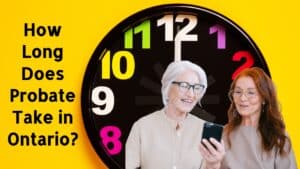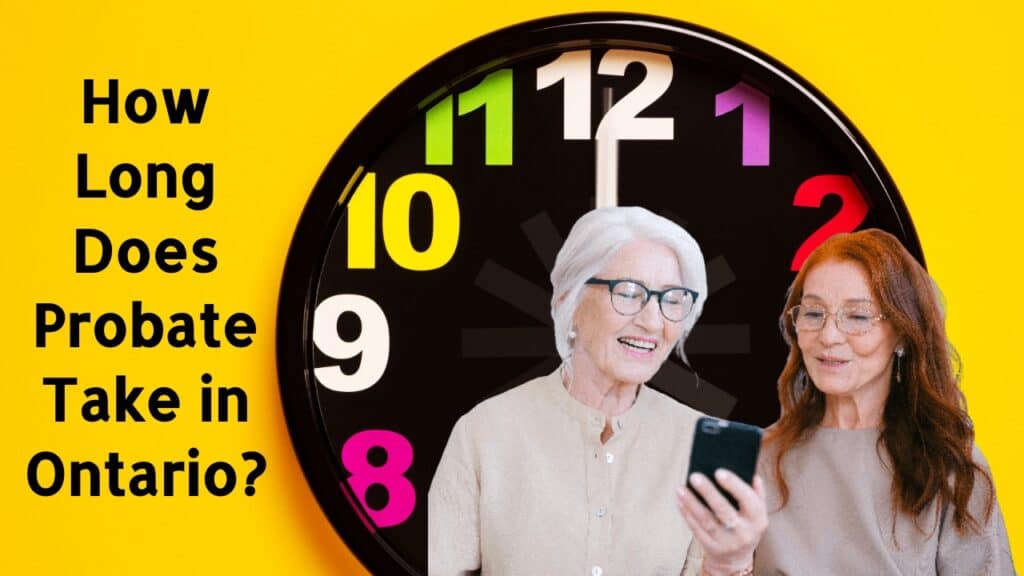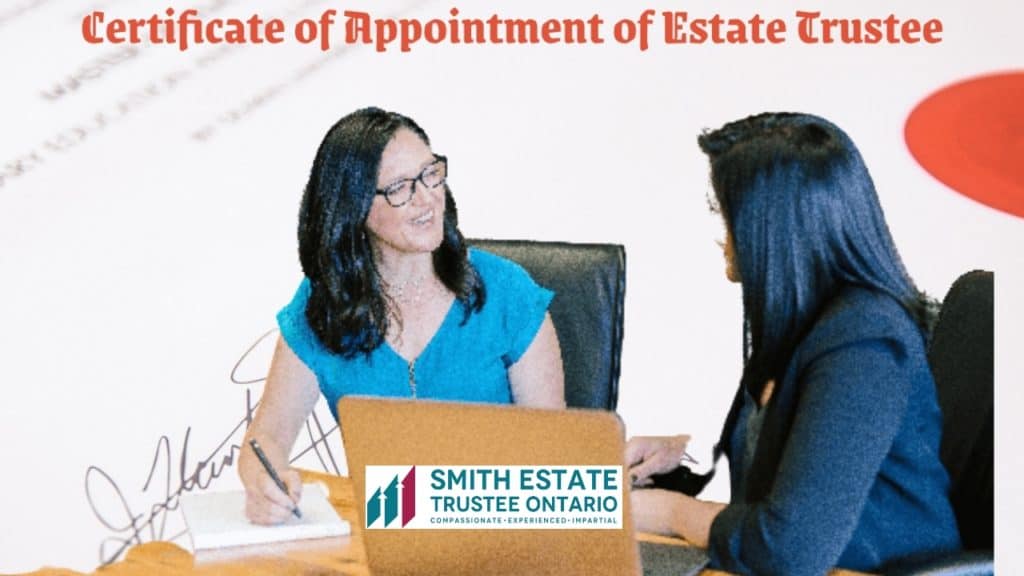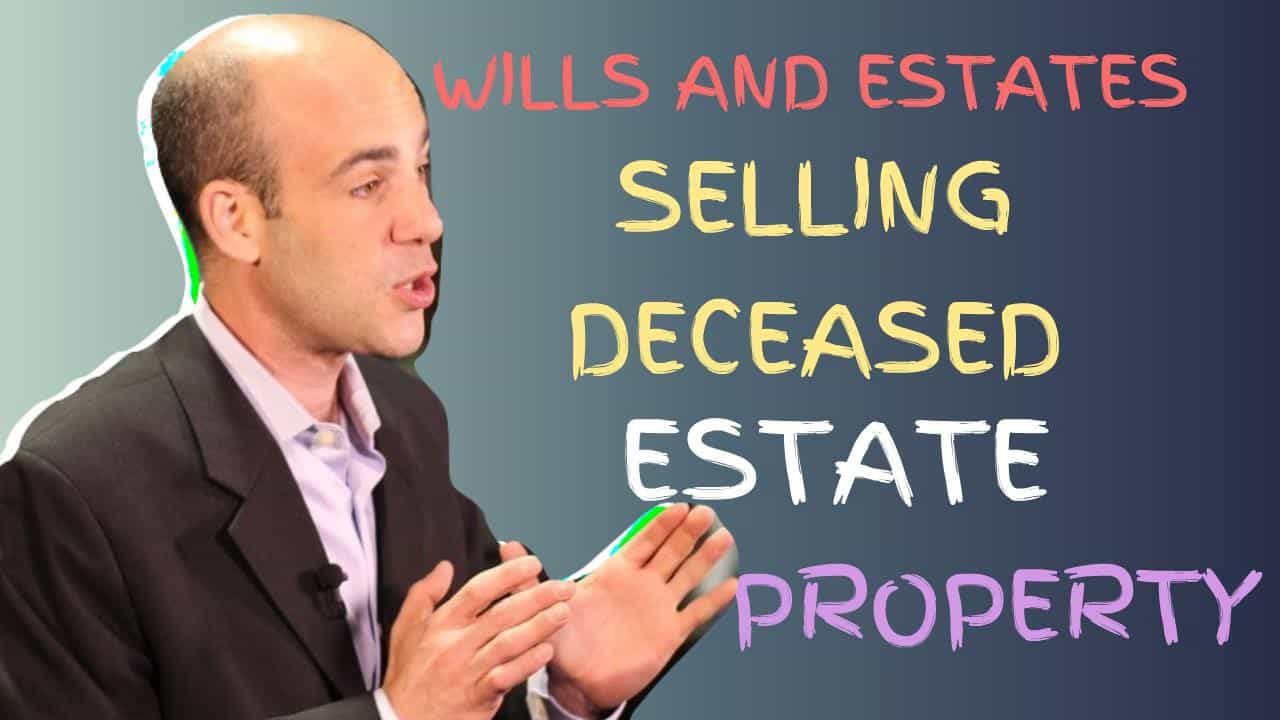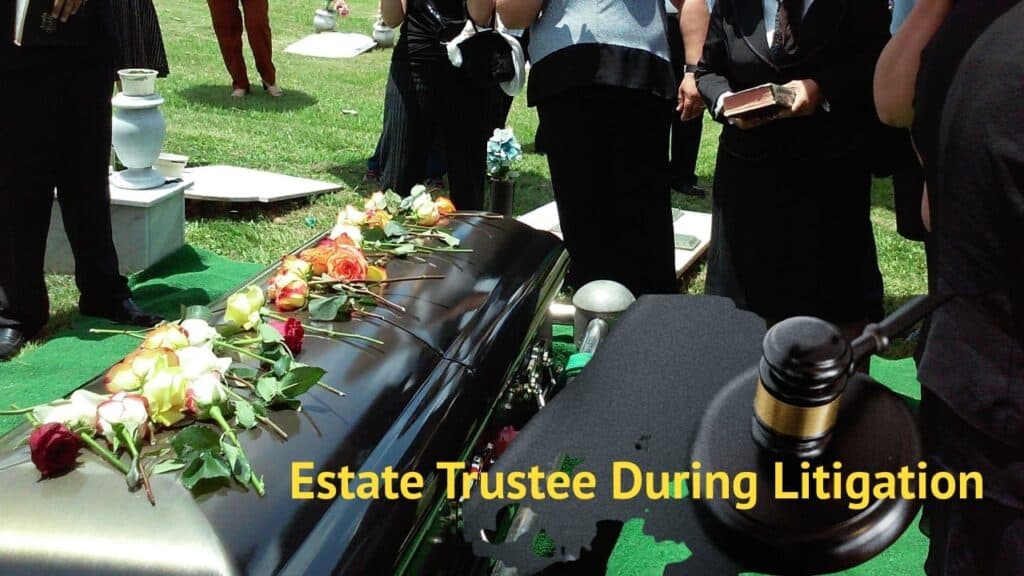 We hope that you and your family are safe, healthy and secure during this COVID-19 pandemic.
We hope that you and your family are safe, healthy and secure during this COVID-19 pandemic.
Ira Smith Trustee & Receiver Inc. is absolutely operational and Ira, in addition to Brandon Smith, is readily available for a telephone consultation or video meeting.
If you would prefer to listen to the audio version of this Brandon Blog, please scroll to the very bottom and click play on the podcast.
Estate Trustee During Litigation: What is it?
All of us with business or family assets and/or debts can be subject to litigation or worry about it. Whatever the reason, the reality is that no one can remove themselves from the litigation process…not at the beginning, not at the end, and not even in death. Perhaps it is an employee or partner, a spouse or ex-spouse, your children or grandchildren, or even your parents.
Many times a person’s death creates Estate litigation between family members; either over a Will or because there is no Will! Sometimes it is necessary for the appointment of a neutral, independent court officer to control the Estate assets and deal with Estate issues while the beneficiaries and other potential stakeholders are involved in Estate litigation.
In our sister business, Smith Estate Trustee Ontario, we accept the appointment of Estate Trustee and we can also act as the independent court officer Estate Trustee During Litigation. This Brandon Blog is about why it may be necessary for the court to appoint an Estate Trustee During Litigation and why it may turn out to be a necessity.
The role of an Estate Trustee During Litigation
An Estate Trustee During Litigation is tasked with protecting the Estate while the litigation is ongoing and gathering information and, sometimes, helping to resolve the litigation.
The duties include, in particular:
- Calculating the fair market value of the estate’s assets and liabilities.
- Keeping its assets safe and secure.
- Retaining and, if necessary, tracing anything discovered to be missing.
- Keeping separate trust accounts.
- Reviewing and handling protective and other expenditures.
- Establishing, defending, settling and paying any debts.
- The filing of income tax returns and if the situation allows for it, whatever tax planning to reduce income taxes can take place.
- Investing estate funds to maximize yields until the Estate Trustee During Litigation is discharged of its obligations and funds.
Because of their experience, resources, objectivity, and integrity are sometimes viewed as the best option. As a matter of common law, responsibilities of the Estate Trustee During Litigation cease upon the termination of the litigation, and they are required to transfer assets without having to be ordered to do so separately.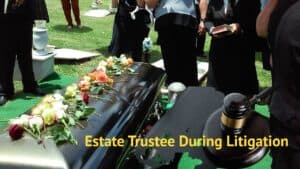
Appointing an Estate Trustee During Litigation
A court appoints an Estate Trustee During Litigation to handle the deceased estate. Section 28 of the Ontario Estates Act, R.S.O. 1990, c. E.21 provides the statutory authority. The Ontario Superior Court of Justice grants administration in the case of either intestacy (when there is no Will) or pending a valid challenge to the validity of the Will, or some other action involving the Will and the deceased estate.
While the ongoing litigation continues, the Estate Trustee During Litigation has all the powers and rights of a general administrator, except for the right to distribute the residue of the property. Administrators of such estates are subject to the immediate control and direction of the court, and the court may order that the administrator receive reasonable remuneration from the estate of the decedent.
Court Appoints Estate Trustee During Litigation
The court appoints the Estate Trustee During Litigation and can set its remuneration. Therefore, the court must have some guiding principles it follows to determine when it is appropriate to make such an appointment. Well, it does. It comes from a situation I previously wrote about in my July 24, 2019, Brandon Blog DYING WITHOUT A WILL IN ONTARIO: DISTRIBUTION TO HEIRS NOT EASY. In that Brandon Blog, I wrote about Toller James Montague Cranston, deceased.
Toller Cranston was a popular Canadian figure skater and artist. He passed away on January 23, 2015, in Mexico where he lived for some 23 years. He passed away without leaving a Will. His sister, Phillipa Baran, was appointed Estate Trustee of the Estate of Toller Cranston by the Mexican court on September 3, 2015, on the consent of Phillipa and her two brothers, Guy Francis Cranston and Hugh Goldie Cranston. These three siblings were the only beneficiaries. In December 2016, her appointment as Estate Trustee of the Estate of Toller Cranston was confirmed by the Ontario court, also on consent. Phillipa Baran, therefore, had sole authority for Estate administration.
Estate litigation ensued and the court-appointed an Estate Trustee During Litigation. A rift between the three beneficiaries developed. The brothers filed a motion to remove their sister as Estate Trustee. One of the points of contention between the siblings was the manner ins which Phillippa Baran was handling the sale of Estate Assets, namely, the artwork of Toller Cranston. While that Estate litigation was pending, in 2019, the Master in the Estates court appointed an Estate Trustee During Litigation to take charge of trust property remaining in the meantime until the issue could be resolved.
During the litigation involving the Estate of Toller James Montague Cranston, the Master ordered the Estate Trustee During Litigation to act without posting an Administration Bond. The Master also ordered that all assets of the Estate shall be immediately turned over to the Estate Trustee Under Litigation who shall also file a Consent with the court. Phillipa Baran was ordered to fully cooperate in the transfer of the Estate assets and the production of records, including all financial records.
Philipa Baran appeals the appointment of the Estate Trustee During Litigation
Philippa Baran sought to set aside the Master’s decision and order appointing an Estate Trustee During Litigation. Her appeal was heard by the Divisional Court. According to the court, the Ontario Superior Court of Justice has statutory authority to appoint an Estate Trustee During Litigation.
On this appeal, the Divisional Court Judge felt the appeal boiled down to two points. Specifically, whether the decision of the Master should be set aside and whether the order issued exceeded the Master’s jurisdiction.
The Divisional Court determined that the Master did not err in either law or fact based on its review of the relevant statutory provisions and jurisprudence. The Judge found nothing wrong with the Master’s Order.
To be fair to Ms. Baran, the Judge noted that there is evidence that she has worked very hard to manage the estate’s assets and debts since Toller Cranston died. It has been a challenging task. It appears, however, that the parties have reached a deadlock.
The Judge also thought Ms. Baran’s handling of the remaining artwork, including either selling the art over her brothers’ objections or planning future rights to the artwork without consulting Guy Cranston or Goldie Cranston, was unreasonable and contrary to her obligations as Estate Trustee.
Ms. Baran was, in the court’s view, in a conflict of interest in this litigation. Ms. Baran’s appeal was therefore dismissed, the appointment of the Estate Trustee During Litigation stands and Ms. Baran must temporarily return her Certificate of Appointment to the court.
Estate Trustee During Litigation: A Primer for Accountants and Lawyers
In addition, the Divisional Court noted some of the factors that will be considered by the court in determining whether or not it should exercise its discretion to appoint an Estate Trustee During Litigation. Accounting firms, lawyers, and anyone advising in the Estates area should be aware of these factors.
In terms of the court’s jurisdiction to appoint an Estate Trustee During Litigation, the following points were confirmed:
- When necessary, the court can draw upon its inherent jurisdiction to protect parties and ensure justice in the proceeding by supervising the management of estates and controlling its own processes.
- It is in the court’s inherent jurisdiction to appoint an officer to preserve and protect the assets of an Estate that may be at risk during litigation.
- A level playing field must be ensured and the assets of the estate protected from the tactics used by litigating parties. No one should be able to use their control over the Estate to benefit themselves or to hurt the other beneficiaries.
- It is crucial to administer an Estate’s assets to the maximum advantage of its beneficiaries. When an Estate Trustee faces an adversarial position towards his/her co-trustees or beneficiary, it is prudent to replace that trustee temporarily;’simple prudence demands it.
- A court should only refuse the appointment of an Estate Trustee During Litigation in the clearest of cases since it is not an extraordinary measure. In most conflicts between the trustee and beneficiaries, the court will favour the appointment, unless it is not one of those very challenging Estates thereby making the estate administration straightforward.
According to the Divisional Court:
Whether an Estate Trustee During Litigation should be appointed is a discretionary decision. In determining whether the discretion to appoint an Estate Trustee During Litigation should be exercised, the following factors should be considered:
- An Estate Trustee may be a witness in litigation.
- Conflicts of interest are possible.
- Conflict of interests between the Estate Trustee and/or beneficiaries.
- There is hostility between the Estate Trustee and/or beneficiaries.
- There is a lack of communication between the parties.
- There is evidence that some parties were excluded from settlement discussions.

Estate Trustee During Litigation summary
I hope you have found this Estate Trustee During Litigation Brandon Blog informative. The death of a loved one is probably the most traumatic life event you will encounter. It is doubly so if your loved one dies intestate and family members tie up the Estate with costly litigation.
Are you a stakeholder in Estate litigation where the appointment of an independent, neutral court officer can at least unlock the jamming up of assets so that the assets can be preserved and their value maximized for the beneficiaries? If so, Smith Estate Trustee Ontario can help you. Contact us so that we can provide a no-cost consultation to see how we can help you and the other beneficiaries.
Do you have way too much financial debt? Prior to you getting to the phase where you can’t make ends meet reach out to me. I am a licensed insolvency trustee (previously called a bankruptcy trustee). In fact, if you understand that you can’t pay your financial debts heading into or in your retired life, contact us.
We understand the pain and stress excessive financial debt can trigger. We can aid you to get rid of that discomfort as well as address your financial problems by offering prompt action and the ideal plan.
Call Ira Smith Trustee & Receiver Inc. today. Make an appointment with one of the Ira Smith Team for a free, no-obligation consultation and you can be on your way to enjoying a carefree retirement Starting Over, Starting Now. Give us a call today so that we can help you get back to stress and pain-free life, Starting Over, Starting Now.
We hope that you and your family are safe, healthy and secure during this COVID-19 pandemic.
Ira Smith Trustee & Receiver Inc. is absolutely operational and Ira, in addition to Brandon Smith, is readily available for a telephone consultation or video meeting.

